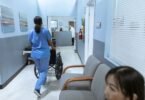Are you a skilled healthcare professional seeking a life-changing career opportunity abroad? With New Zealand facing critical workforce shortages in nursing, midwifery, aged‑care, and various medical roles, hospitals and care providers across the nation are actively offering visa‑sponsored positions. From bustling urban medical centres to supportive rural clinics, accredited organisations are eager to hire—and often provide relocation support, competitive salaries, and pathways to permanent residency.
This post explores why healthcare roles are in high demand, details the visa sponsorship options available, profiles employers hiring now, and offers practical advice to streamline your application process—all structured for maximum readability and SEO performance. Whether you’re a registered nurse, caregiver, or clinical specialist, this guide is designed to connect you with high‑value opportunities and attract advertisers from immigration agencies, recruitment platforms, legal services, and educational providers.
Why Healthcare Workers Are in High Demand in New Zealand
New Zealand’s healthcare system, overseen by Te Whatu Ora (Health New Zealand) since mid‑2022 after centralising 20 former district health boards, faces serious staffing gaps due to retirements, population aging, and falling training enrolments.
-
Up to 20% of nurses are expected to retire in the next five years.
-
Persistent shortages are seen in critical care, aged care, general medicine, surgery, midwifery, and allied health.
-
Families looking to migrate or agencies seeking high-paying ad placements (e.g., immigration lawyers, job boards, language schools) can benefit from ranking within this growing healthcare migration niche.
Which Healthcare Roles Offer Visa Sponsorship?
Registered Nurses & Midwives
-
Roles like Registered Nurse (Aged Care), Critical Care, Pediatrics, and Midwifery are frequently listed with visa sponsorship by hospitals, aged‑care organisations, and public health providers.
-
Many such roles fall under Immigration New Zealand’s “Green List”, enabling Fast‑Track Residency or Straight to Residence Visa options for eligible applicants.
Healthcare Assistants / Care Partners
-
Entry‑level roles such as Health Care Assistant (Level 3 and 4) are advertised with Accredited Employer Work Visa (AEWV) eligibility in rest homes and care facilities.
-
Employers such as Kumeu Village Rest Home, Radius Care, Bupa New Zealand, Ryman Healthcare, and Oceania Healthcare frequently sponsor these positions.
Clinical Nurse Specialists & Coordinators
-
Specialist nursing roles, including Infection Prevention & Control, OPIVA (Out‑Patient Intravenous Antibiotic Service), and Psychogeriatric Clinical Coordinator, offer sponsorship through public provider Health New Zealand–Te Whatu Ora.
Key Visa Pathways for Healthcare Workers
Straight to Residence / Green List Visa
-
For nurses in high-needs categories (e.g. aged care, critical care), permanent residency may be granted before arrival—family included—via the Straight to Residence Visa route.
Accredited Employer Work Visa (AEWV)
-
Requires a job offer from an accredited employer, proof of English proficiency (IELTS ≥ 6.5 or OET B), and minimum pay requirements. Typically allows 3‑year tenure with transition to residency later.
Care Workforce to Residence Visa
-
For caregivers working in roles at or above Level 4 wage (currently NZD 23.50/hr) for 12 months, this visa offers a clear path to residency within a year.
Specific Purpose / Temporary Visas
-
Used by nurses entering competency assessment programmes (CAP) or bridging placements—often transitional to AEWV or future registration.
Top Employers Hiring Now & Typical Salary Ranges
Te Whatu Ora (Health New Zealand)
-
Public provider operating all district hospitals and offering numerous roles: Registered Nurse in SCBU (e.g. Rotorua), Clinical Nurse Specialists (OPIVA in Auckland; IPC in Queenstown), Orderly/Security roles and more.
-
Salaries often range from NZD 82,000 to NZD 163,000 depending on speciality and seniority.
Aged Care & Rest-Home Providers
-
Employers like Ryman Healthcare, Summerset, Bupa, Oceania, Radius Care regularly offer sponsorship for nurses and care partners.
-
Registered Nurses (Aged Care): NZD 82,000–107,000; Care Partners: Level‑4 care workforce pay (NZD 48,000–62,000/year depending on hours and bonuses) .
Recruitment Agencies & Home Care Services
-
Agencies like Geneva Healthcare, Medcall, Healthcare NZ, and Drake Medox place international caregivers with visa sponsorship and relocation aid in home‑based care roles.
Registration, Licensing & English Language Requirements
Before you can work in healthcare in New Zealand, especially in regulated professions like nursing or allied health, you must meet strict eligibility and licensing criteria.
For Registered Nurses & Midwives: NCNZ Registration
To practice as a nurse or midwife in New Zealand, you must be registered with the Nursing Council of New Zealand (NCNZ). Key requirements include:
-
Proof of international nursing qualification that is equivalent to New Zealand standards.
-
Verification through CGFNS International or EPIC (Educational Commission for Foreign Medical Graduates).
-
Completion of a Competency Assessment Programme (CAP) for most internationally qualified nurses.
-
Valid English proficiency scores (IELTS ≥ 6.5 in each band or OET with a B minimum in each sub-test).
For Healthcare Assistants & Aged Care Workers
These roles are often unregulated, meaning formal registration is not required. However:
-
Some employers require Level 3 or Level 4 NZQA Qualifications, often obtainable on the job or through bridging courses.
-
Basic English fluency, physical fitness, and a clean criminal background check are typically needed.
For Allied Health Professionals
Occupational therapists, physiotherapists, radiographers, and lab technicians must be registered with their respective councils. Most require:
-
Verified overseas qualifications
-
Professional practice documentation
-
Proof of English fluency (IELTS/OET)
Application Strategy: How to Land a Sponsored Healthcare Job
Getting hired in New Zealand’s healthcare system from overseas requires strategy. Here’s a step-by-step guide tailored for visa-sponsored seekers:
Step 1: Identify Green List or AEWV-eligible Roles
-
Visit Immigration New Zealand’s Green List to target roles that fast-track residency.
-
Use job platforms like Seek, TradeMe Jobs, Indeed New Zealand, and the Te Whatu Ora Careers Portal.
Step 2: Build a New Zealand-Style CV and Cover Letter
-
Use a clean, factual CV layout: no photos, no date of birth.
-
Focus on qualifications, work experience, and clinical skills relevant to NZ’s healthcare system.
-
Be sure to mention eligibility for NCNZ or that you are in the process of CAP.
Step 3: Apply Directly or via an Agency
-
Trusted international recruiters (e.g., Geneva Healthcare, Accent Health, HealthStaff Recruitment) can simplify the process and assist with visa sponsorship.
-
Direct applications through the hospital website or government job boards are also viable and often more transparent.
Step 4: Prepare for Interviews and Documentation
-
Be ready with notarized copies of qualifications, work reference letters, English test results, and health checks.
-
Familiarize yourself with interview formats used in New Zealand (behavioral/situational).
Step 5: Navigate the Visa Process
-
After receiving a job offer, your employer will submit an employer accreditation check and job check.
-
You then apply for an Accredited Employer Work Visa (AEWV) or Straight to Residence Visa, depending on the job.
Tips to Increase Your Chances of Getting Hired (and Sponsored)
Highlight Skills in Demand
-
Aged care experience, dementia care, ICU/CCU training, and wound care are in high demand.
-
Cultural competence, empathy, and fluency in English also play a big role.
Get Started with NCNZ or Allied Council Registration Early
-
Most employers won’t offer sponsorship without a clear pathway to registration.
-
Even applying to CAP programmes will increase your chances of being shortlisted.
Be Open to Regional or Rural Assignments
-
Roles in places like Hawke’s Bay, Southland, or Whangārei offer better sponsorship odds than oversaturated areas like Auckland or Wellington.
-
These regions also offer better pathways to residency via the Skilled Migrant Category.
Stay Updated on Immigration Policy Changes
-
Policies evolve frequently. In 2023–2025, New Zealand has expanded visa options for healthcare workers, and further streamlining is expected.
Conclusion
New Zealand isn’t just a beautiful country—it’s a nation in urgent need of compassionate, skilled, and committed healthcare workers. Whether you’re a registered nurse, a caregiver, a clinical specialist, or just starting out in aged care, there’s a place for you in New Zealand’s public or private health sector—with visa sponsorship and pathways to permanent residency on offer.
As the population ages and the demand for care intensifies, hospitals, rest homes, and rural clinics across the country are extending open arms to global professionals. And with New Zealand’s immigration system now more streamlined than ever—through the Green List, Accredited Employer Work Visa, and Straight to Residence Visa—the door is wide open for internationally qualified health professionals to build fulfilling lives and careers.





